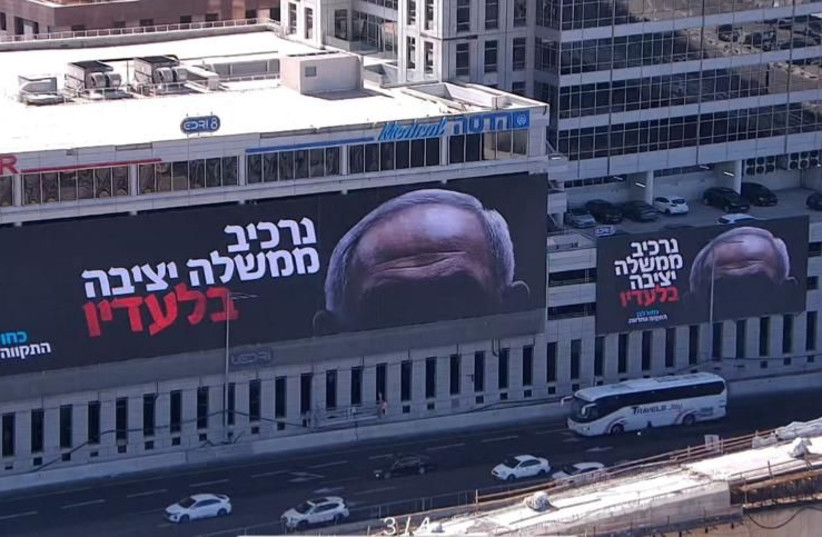The announcements by Interior Minister Ayelet Shaked and Communications Minister Yoaz Hendel on their merger of Derech Eretz and Yamina differed slightly from each other. While they hope to attract voters to the new party, Zionist Spirit, from different shades of the right-wing camp, the mixed messages could lead to the opposite happening and push them further below the electoral threshold.
Despite echoing similar themes at their news conference on Wednesday night – the need for a stable government, repairing the schisms in Israeli society, the ability to “get things done” and freeing the market from unnecessary regulation – Shaked positioned herself squarely to the right of the Likud, while Hendel did not.
First, Shaked noticeably refrained from mentioning whether she would join a government led by opposition leader Benjamin Netanyahu. She mentioned Netanyahu’s name only once in her speech: “The housing crisis and high cost of living are not interested in ‘yes Bibi, no Bibi.’”
While she mentioned the need for a “Zionist unity government,” at times she interchanged the word “Zionist” with the word “national,” a term usually reserved for the right-wing camp.
Shaked also mentioned the need for a “Jewish and sovereign state,” a phrase that differed from the oft-used “Jewish and democratic state.” The Left sometimes refers to itself as the “democratic camp,” and the absence of the word “democracy” was noticeable.

While Shaked said she opposed a narrow government, she only mentioned the lesson she learned in the past year: not to be dependent on Arab parties. But she did not mention Religious Zionist Party MK Itamar Ben-Gvir, leader Otzma Yehudit, or the far Right.
In fact, immediately after saying she opposed a narrow government, Shaked said: “During the entire period, something was missing – it was spirit, a Zionist spirit. Citizens of Israel, today we are bringing back the spirit, bringing back the nationalist Zionist spirit.” The Religious Zionist party fits this bill, and Shaked seemed to be embracing it.
Hendel strikes a different tone
HENDEL SPOKE to a different tune. Toward the beginning of his speech, he accused the Right of doing only what was good for Netanyahu, and then he repeated himself a minute later: “We are determinately against a narrow government [led] by Netanyahu, which will only deal with whatever is good for him.”
Regarding Netanyahu’s trial, Hendel said: “One camp offers a 61-seat government with Ben-Gvir that will fire the attorney-general, halt the trial and many more topics that have to do with one man only.”
This is an argument repeated often by the Center-Left. Hendel also bluntly said that the only way forward was a government with the Likud and the Center-Left. Religious Zionism was noticeably absent.
Furthermore, Hendel used the phrase Yamin mamlachti, the statesmanlike Right, which New Hope leader Gideon Sa’ar and Blue and White chairman Benny Gantz also used to describe their joint party. In contrast, the word mamlachti was absent from Shaked’s speech.
Hendel also attacked what he deemed “Lebanonization of the Negev, Galilee and mixed cities,” which he described as “shooting in the streets, protection, polygamy, armed militias in the Arab sector and loss of land.” But unlike Shaked, Hendel’s criticism was directed not at the current government but at “decision-makers cowardice and inaction for decades,” who “preferred to avoid complications and only wanted political survival.”
The general impression that Shaked made is that while she opposes a narrow government, she is squarely in the right-wing camp, and when push comes to shove, she may join a purely right-wing, Netanyahu-led government.
However, the impression Hendel made is that he opposes such a government, not only because it would have a narrow majority, but because of Netanyahu’s attempt to call off his trial. He seemed to strongly prefer a government whose edges were Likud or “Zionist Spirit” on the Right and perhaps Yesh Atid on the Left.
Although these discrepancies seem insignificant, they may cause voters to avoid voting for Zionist Spirit. Anti-Netanyahu, moderate-Right voters may be put off by Shaked’s rhetoric, while some of her current supporters may be put off by Hendel’s strong sentiments against a fully right-wing government and fear that he will lead the party back into a government similar to the current one.
The mixed messages could offset any gains the two made by merging, and keep them below the electoral threshold, where they have sat since the beginning of July.

Serial promise breakers
One more point should be made.
Both Shaked and Hendel are guilty of breaking promises that they made to their voters, with serious ramifications. Shaked joined the current government along with former Yamina leader Naftali Bennett despite pledging not to do so, and Hendel and his colleague MK Zvi Hauser broke away from Moshe Ya’alon’s Telem Party in 2021, formed their own party and joined the rotation government under Netanyahu despite Ya’alon’s pledge to voters that the parties would not.
Shaked and Hendel are both running on thin ice. If the mixed messages continue, they may end up falling through.
